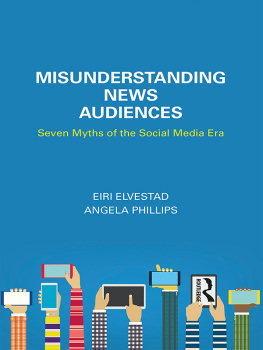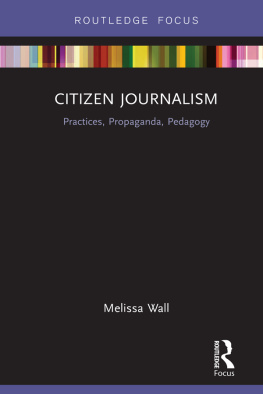The Places and Spaces of News Audiences
Historically, or so we would like to believe, the story of everyday life for many people included regular, definitive moments of news consumption. Journalism, in fact, was distributed around these routines: papers were delivered before breakfast, the evening news on TV buttressed the transition from dinner to prime time programming, and radio updates were centred around commuting patterns. These habits were organized not just around specific times but occurred in specific places, following a predictable pattern.
However, the past few decades have witnessed tremendous changes in the ways we can consume journalism and engage with information from tablets, to smartphones, online, and so forth and the different places and moments of news consumption have multiplied as a result, to the point where news is increasingly mobile and instantaneous. It is personalized, localized, and available on-demand. Day-by-day, month-by-month, year-by-year, technology moves forward, impacting more than just the ways in which we get news. These fundamental shifts change what news is. This book expands our understanding of contemporary news audiences and explores how the different places and spaces of news consumption change both our experiences of journalism and the roles it plays in our everyday lives. This book was originally published as a special issue of Journalism Studies.
Chris Peters is Associate Professor of Media and Communication at Aalborg Universitys Copenhagen campus, Denmark. His research explores the ways people get and experience information in everyday life and the sociocultural impact of transformations in the digital era. His publications include Rethinking Journalism, Rethinking Journalism Again, and Retelling Journalism.
Journalism Studies: Theory and Practice
Edited by
Bob Franklin
Cardiff School of Journalism, Media and Cultural Studies, Cardiff University, UK
The journal Journalism Studies was established at the turn of the new millennium by Bob Franklin. It was launched in the context of a burgeoning interest in the scholarly study of journalism and an expansive global community of journalism scholars and researchers. The ambition was to provide a forum for the critical discussion and study of journalism as a subject of intellectual inquiry but also an arena of professional practice. Previously, the study of journalism in the United Kingdom and much of Europe was a fairly marginal branch of the larger disciplines of media, communication, and cultural studies; only a handful of Universities offered degree programmes in the subject. Journalism Studies has flourished and succeeded in providing the intended public space for discussion of research on key issues within the field, to the point where in 2007 a sister journal, Journalism Practice, was launched to enable an enhanced focus on practice-based issues, as well as foregrounding studies of journalism education, training, and professional concerns. Both journals are among the leading ranked journals within the field and publish six issues annually, in electronic and print formats. More recently, 2013 witnessed the launch of a further companion journal, Digital Journalism, to provide a site for scholarly discussion, analysis, and responses to the wide ranging implications of digital technologies for the practice and study of journalism. From the outset, the publication of themed issues has been a commitment for all journals. Their purpose is first, to focus on highly significant or neglected areas of the field; second, to facilitate discussion and analysis of important and topical policy issues; and third, to offer readers an especially high quality and closely focused set of essays, analyses and discussions.
The Journalism Studies: Theory and Practice book series draws on a wide range of these themed issues from all journals and thereby extends the critical and public forum provided by them. The Editor of the journals works closely with guest editors to ensure that the books achieve relevance for readers and the highest standards of research rigour and academic excellence. The series makes a significant contribution to the field of journalism studies by inviting distinguished scholars, academics, and journalism practitioners to discuss and debate the central concerns within the field. It also reaches a wider readership of scholars, students and practitioners across the social sciences, humanities and communication arts, encouraging them to engage critically with, but also to interrogate, the specialist scholarly studies of journalism which this series provides.
Mapping the Magazine: Comparative Studies in Magazine Journalism
Edited by Tim Holmes
The Future of Newspapers
Edited by Bob Franklin
Language and Journalism
Edited by John Richardson
The Future of Journalism
Edited by Bob Franklin
Exploration in Global Media Ethics
Edited by Muhammad Ayish and Shakuntala Rao
Foreign Correspondence
Edited by John Maxwell Hamilton and Regina G. Lawrence
How Journalism Uses History
Edited by Martin Conboy
Lifestyle Journalism
Edited by Folker Hanusch
Environmental Journalism
Edited by Henrik Bdker and Irene Neverla
Online Reporting of Elections
Edited by Einar Thorsen
The Future of Journalism: Developments and Debates
Edited by Bob Franklin
Cross-continental Views on Journalistic Skills
Edited by Leen d'Haenens, Michal Opgenhaffen and Maarten Corten
Cosmopolitanism and the New News Media
Edited by Lilie Chouliaraki and Bolette Blaagaard
The Press and Popular Culture in Interwar Europe
Edited by Sarah Newman and Matt Houlbrook
Community Journalism Midst Media Revolution
Edited by Sue Robinson
Digital Technologies and the Evolving African Newsroom: Towards an African Digital Journalism Epistemology
Edited by Hayes Mawindi Mabweazara
Making Sense of Mediatized Politics: Theoretical and Empirical Perspectives
Edited by Jesper Strmbck and Frank Esser
The Future of Journalism in an Age of Digital Media and Economic Uncertainty
Edited by Bob Franklin
The Places and Spaces of News Audiences
Edited by Chris Peters
Theories of Journalism in a Digital Age
Edited by Steen Steensen and Laura Ahva
Journalism in an Era of Big Data: Cases, Concepts and Critiques
Edited by Seth C. Lewis
First published 2017
by Routledge
2 Park Square, Milton Park, Abingdon, Oxon, OX14 4RN, UK
and by Routledge
711 Third Avenue, New York, NY 10017, USA
Routledge is an imprint of the Taylor & Francis Group, an informa business
2017 Taylor & Francis
All rights reserved. No part of this book may be reprinted or reproduced or utilised in any form or by any electronic, mechanical, or other means, now known or hereafter invented, including photocopying and recording, or in any information storage or retrieval system, without permission in writing from the publishers.
Trademark notice: Product or corporate names may be trademarks or registered trademarks, and are used only for identification and explanation without intent to infringe.
British Library Cataloguing in Publication Data






